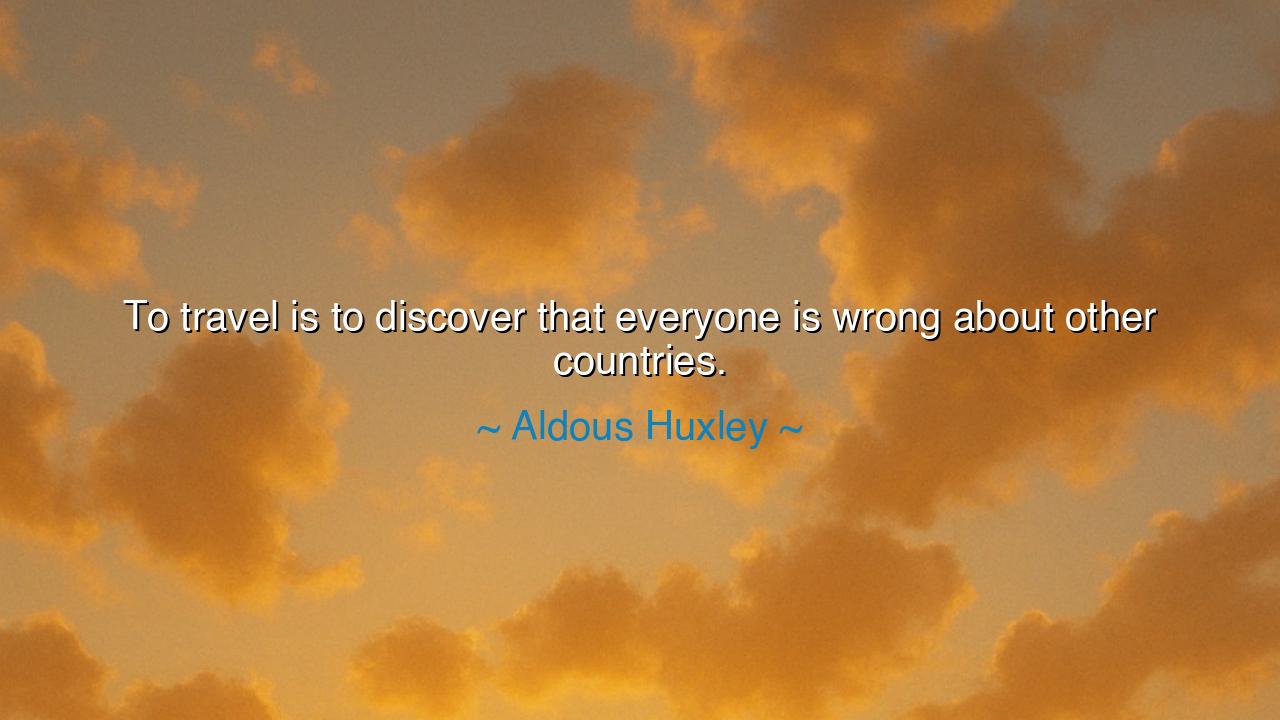
To travel is to discover that everyone is wrong about other






The philosopher of modern letters, Aldous Huxley, once declared: “To travel is to discover that everyone is wrong about other countries.” These words, deceptively simple, carry within them a thunderous wisdom. For they reveal that much of what we think we know about the world is but shadow, hearsay, and illusion. Only the one who leaves the comfort of his own walls, who walks the streets of foreign lands, who tastes their food and hears their laughter, begins to see that reality is richer, deeper, and more human than rumor and prejudice could ever paint it.
When Huxley says that “everyone is wrong,” he does not mean that the world is unknowable, but that assumptions are false. Each nation looks upon the other with colored lenses, shaped by politics, pride, or fear. One people may imagine another as cruel, another as lazy, another as decadent or primitive. Yet to set foot among them is to find mothers raising children, merchants laboring honestly, youths dreaming of tomorrow—all bound by the same joys and sorrows as any other people. Travel shatters caricature and replaces it with truth, teaching the traveler humility.
The heart of his teaching is that “to travel is to discover.” Discovery here is not of monuments alone, nor of landscapes, but of the humanity of others. The wise traveler learns that difference is not inferiority, and strangeness is not danger. Indeed, the more foreign a people first appear, the more striking becomes the revelation of their shared humanity. In their songs, their markets, their prayers, we recognize ourselves. The discovery, then, is double: the truth of others, and the truth of ourselves reflected in them.
History provides luminous examples. Consider Herodotus, the ancient historian, who wandered far beyond the borders of Greece. His writings told of Egyptians, Persians, and Scythians—not as monsters, as some believed, but as men with customs, laws, and wisdom of their own. By traveling, he unmasked the falsehood of narrow minds, revealing that what one people calls strange, another calls sacred. Or think of Marco Polo, whose accounts of China astonished Europe. Many doubted him, for what he saw contradicted their beliefs—but time proved his truth, and the myths of the East gave way to knowledge.
The origin of Huxley’s insight lies in the arrogance of isolation. Peoples who never leave their homeland grow certain that their way is the measure of all things. They imagine foreign nations only through stories told by merchants, generals, or politicians—stories twisted by pride or fear. Huxley, like the sages before him, saw that the cure to such blindness is not argument, but experience. Step into another’s land, eat at their table, share in their daily life, and the walls of ignorance crumble like dust.
The lesson for us is powerful: do not trust the easy tale of what another nation is. Do not let fear, politics, or prejudice tell you who strangers are. If you wish to know, go and see. Speak with the people themselves, listen to their stories, and let your heart discover the truth. The one who travels learns humility; the one who refuses remains chained by falsehood. Travel is not merely movement of the body, but awakening of the soul.
Practical actions flow clearly. If you can travel, do so with open eyes and open heart. Do not seek only the monuments of stone, but the monuments of spirit: the smiles of children, the kindness of strangers, the wisdom of elders. If you cannot travel far, seek out the cultures around you—your neighbors, your communities, the voices different from your own. Ask questions. Listen without judgment. In doing so, you become a traveler of the heart, even without crossing seas.
Thus, Huxley’s words endure as an eternal teaching: “To travel is to discover that everyone is wrong about other countries.” They remind us that truth is never found in hearsay, but in encounter; never in prejudice, but in presence. To future generations, let this be passed on: the world is vast, and the stories of others are not as you have been told. Go forth, discover, and learn that humanity, in all its forms, is greater than rumor and more beautiful than fear.






AAdministratorAdministrator
Welcome, honored guests. Please leave a comment, we will respond soon